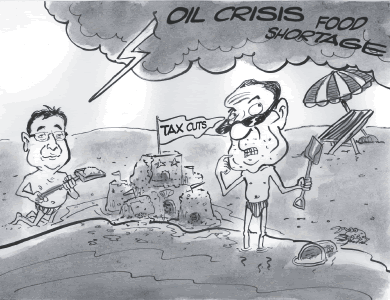
EDITORIAL | Wednesday, 21 May 2008 The moment of economic truth
Last October, economist Prof. Edward Scicluna warned that Budget 2008 was based on an unrealistic projection that economic growth would continue at the same rate as the previous year, despite numerous indications to the contrary.
These included an IMF report for 2007, which lowered its previous prognostications for Malta’s economic recovery in the coming fiscal year; and also the widely predicted increase in international oil and cereal prices, which are currently wreaking havoc with government finances. At the time, the Ministry of Finance rebutted that it had already taken these projections into account, and argued that its own estimates for the coming year were “conservative”, leaving more than enough room to manoeuvre in case of unforeseen eventualities. Six months and one general election later, the Finance Ministry is singing a slightly different tune. Already Minister Tonio Fenech has pre-emptively defended himself in the event of a climb-down from his government’s generous pre-election promises, warning that the promised tax cuts were not “etched in stone”, and that they were unlikely to materialise after all this year. The tax band revision may not have been etched in stone, but it was certainly printed in the Nationalist Party’s electoral manifesto... as indeed were 352 other promises, all of which were made in full cognisance of the economic storm brewing on the horizon. Already the rumbling of thunder can be heard in the distance. For one thing, the Bank of Valletta’s half-yearly estimates indicate a reduction in yearly profits by half: a worrying development, which will eat into government revenue for this year, and with it government’s ability to make good on its own optimistic economic programme for 2013. More importantly, the bank itself may be tempted to rein in its lending regime… a move which will no doubt contribute to controlling inflation, but which will also seriously limit Malta’s potential for continued economic growth, upon which so much of its financial policies are built. In a worst-case scenario, this phenomenon can be expected to snowball across the national economy, if other commercial banks likewise follow suit. From this perspective, government appears caught up in an economic Catch-22 of its own making. Much of its own programme depends on sustained economic growth, itself not impervious to the threat of inflation. Any measures to reduce inflation will therefore hamper government’s ability to deliver on its own pre-electoral promises… many of which are now coming home to roost. Already two of its much-vaunted pre-electoral pledges have proved to be short-lived. One of these involved tax rebates on energy-saving appliances, which failed to outlive a single fiscal year. Another was the shared home equity scheme, which came to a sudden, unexpected end last weekend. The latter was a particularly hard-hitting measure, considering that subsidies for first-time house buyers were high on the agenda of both parties during the election campaign. Launched early in 2006, the scheme was aimed at facilitating the first-time buyer to purchase a home by subsidising the shortfall between the price of the property and the amount a commercial bank was willing to lend. Before the election, it had been presented to the electorate in order to counter-balance the Labour Party’s own electoral promise, which was to subsidise the interest on the purchase of a first home, provided this did not exceed Lm50,000. Now that it has suddenly been withdrawn, one cannot help suspecting that it had served its purpose, which had little to do with subsidising house-buyers and much to do with winning elections. At this point it would be worthwhile bearing in mind government’s own projections for the costs of its electoral promises. These include a €46.6 million decline in government revenue on account of the tax band revision; €5.8 million from the removal of departure tax; and €5.1 million from the abolition of television licence… to which must be added also expected decreases in government revenue accruing from the removal of levies on credit card charges and the abolition of inheritance tax. In view of an expected increase in the utilities surcharge, Prime Minister Lawrence Gonzi may well find himself toning down his pre-electoral exuberance. But while he will no doubt attempt to justify this by pointing towards the increasing cost of oil and cereals – two factors outside his immediate control – he cannot claim to have been unaware of these developments months in advance. After all, he had the warnings of Malta’s foremost economists, not to mention the IMF report, to fall back on. The moment of economic truth appears to have arrived for the Prime Minister who promised a safe pair of hands. On the one hand, he must act responsibly in the face of a worsening international climate. At the same time he must also deliver on the many promises in his party’s manifesto. In a sense, Gonzi could be ironically aided by the fact that tax cuts of the kind he has promised, theoretically serve to increase government revenue in that they encourage more honest declarations by the public. Either way, however, failure to deliver can only be interpreted as an admission that the government’s pre-electoral forecasts were little more than gimmicks aimed at duping the electorate. Any comments? |
MaltaToday News |
Managing editor Saviour Balzan | Tel. ++356 21382741 | Fax: ++356 21385075 | Email
